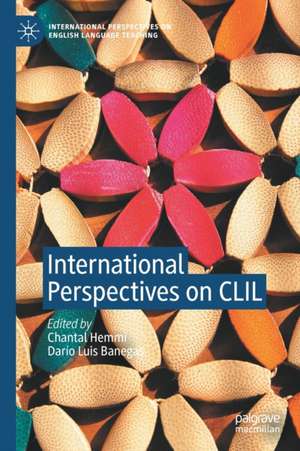International Perspectives on CLIL: International Perspectives on English Language Teaching
Editat de Chantal Hemmi, Darío Luis Banegasen Limba Engleză Paperback – 20 mai 2022
| Toate formatele și edițiile | Preț | Express |
|---|---|---|
| Paperback (1) | 891.65 lei 6-8 săpt. | |
| Springer International Publishing – 20 mai 2022 | 891.65 lei 6-8 săpt. | |
| Hardback (1) | 1006.72 lei 6-8 săpt. | |
| Springer International Publishing – 19 mai 2021 | 1006.72 lei 6-8 săpt. |
Preț: 891.65 lei
Preț vechi: 1087.38 lei
-18% Nou
Puncte Express: 1337
Preț estimativ în valută:
170.64€ • 185.29$ • 143.34£
170.64€ • 185.29$ • 143.34£
Carte tipărită la comandă
Livrare economică 22 aprilie-06 mai
Preluare comenzi: 021 569.72.76
Specificații
ISBN-13: 9783030700973
ISBN-10: 3030700976
Pagini: 300
Ilustrații: XXVIII, 300 p. 23 illus., 2 illus. in color.
Dimensiuni: 155 x 235 x 25 mm
Greutate: 0.46 kg
Ediția:1st ed. 2021
Editura: Springer International Publishing
Colecția Palgrave Macmillan
Seria International Perspectives on English Language Teaching
Locul publicării:Cham, Switzerland
ISBN-10: 3030700976
Pagini: 300
Ilustrații: XXVIII, 300 p. 23 illus., 2 illus. in color.
Dimensiuni: 155 x 235 x 25 mm
Greutate: 0.46 kg
Ediția:1st ed. 2021
Editura: Springer International Publishing
Colecția Palgrave Macmillan
Seria International Perspectives on English Language Teaching
Locul publicării:Cham, Switzerland
Cuprins
Chapter 1: CLIL: An Overview (Chantal Hemmi and Darío Luis Banegas).- Section I: CLIL Practices.- Chapter 2: Authenticity and Motivation in CLIL: Creating a Meaningful Purpose by Experiencing the Language in Use (Richard Pinner).- Chapter 3: Assessing Students’ Learning of History Content in Spanish CLIL Programmes: A Content and Language Integrated Perspective (Elena del Pozo and Ana Llinares).- Chapter 4: Current Practice and Challenged of Assessment in CLIL in a Japanese University Context (Takanori Sato, Katsuya Yokomoto and Graham Mackenzie).- Chapter 5: Translanguaging in Science Lessons: Exploring the Language of Science in L2 Low Achievers in a Public School Setting in Colombia (Edgar Garzón-Díaz).- Chapter 6: The Role of the Essential Question in Eliciting Critical Thinking in CLIL Classes at a Japanese University (Hiroko Aikawa, Emi Fukasawa and Chantal Hemmi).- Chapter 7: Developing Intercultural Competence: A Comparison of CLIL and Language Majors Before and After Industrial Placements (Wenhsien Yang).- Section II: CLIL Professional Development and Awareness.- Chapter 8: The Role of CLIL in Learning About TESOL: Reflections from an Australian Master of TESOL Course (Marianne Turner).- Chapter 9: CLIL-ising EMI: An Analysis of Student and Teacher Training Needs in Monolingual Contexts (María Luisa Pérez Cañado).- Chapter 10: Top-down and Bottom-up CLIL Teacher Development: Lessons Learned from Austrian in-service CLIL Teacher CPD (Andreas Bärnthaler and Keith Kelly).- Chapter 11: Developing the C in Content and Language Integrated Learning: Teacher Preparation that Builds Learners’ Content Knowledge and Academic Language Through Teacher Collaboration and Integrated Pedagogical Training (Margo DelliCarpini).- Chapter 12: Language-driven CLIL in Primary Education: An Analysis of General English Coursebooks in Argentina (Darío Luis Banegas and Gabriela Tavella).- Chapter 13: Sistemas Educacionais (SE) and CLIL Developments in Brazil: From Promises toProspects (Julia Landau, Raul Albuquerque Paraná and Sávio Siqueira).- Chapter 14: CLIL: Present and Future (Darío Luis Banegas and Chantal Hemmi).
Recenzii
“This edited volume is thus a welcome addition to the field, and would serve as a brilliant resource for all stakeholders looking for enhancing their pedagogical or practical CLIL models and/or practices.” (Mahboubeh Rakhshandehroo, RELC Journal, October 7, 2021)
Notă biografică
Chantal Hemmi is an Associate Professor at Sophia University, Japan.
Darío Luis Banegas is a Lecturer at the University of Strathclyde and an Associate Fellow at the University of Warwick, UK.
Darío Luis Banegas is a Lecturer at the University of Strathclyde and an Associate Fellow at the University of Warwick, UK.
Textul de pe ultima copertă
This edited book offers culturally-situated, critical accounts of Content and Language Integrated Learning (CLIL) approaches in diverse educational settings, showcasing authentic examples of how CLIL can be applied to different educational levels from primary to tertiary. The contributors offer a research-based, critical view of CLIL opportunities, challenges and implications in the following areas: teacher education, continuing professional development, assessment, teacher-student dialogue, translanguaging, coursebooks, bilingual education, authenticity, language development and thinking skills. This wide-ranging volume will appeal to students and scholars of English Language Teaching (ELT), language policy and planning, bi- and multilingualism, and applied linguistics more broadly.
Chantal Hemmi is an Associate Professor at Sophia University, Japan.
Darío Luis Banegas is a Lecturer at the University of Strathclydeand an Associate Fellow at the University of Warwick, UK.
Darío Luis Banegas is a Lecturer at the University of Strathclydeand an Associate Fellow at the University of Warwick, UK.
Caracteristici
Proposes a revised conceptualization of CLIL and describes possible context-informed CLIL pedagogies Includes international settings underrepresented in the literature, including Colombia and Kazakhstan Suggests possible future lines of research, with special attention paid to teacher research














